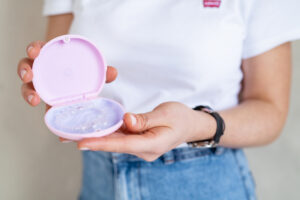Fluoride is a naturally occurring mineral found in water and is also found in various foods.
Why is Fluoride good?
Fluoride provides strength to the tooth enamel, which is almost 100 percent hydroxyl apatite, making teeth strong and resistant.
How does it work against tooth decay?
The anti-caries effect of fluorides can be seen in several ways. On the one hand, it affects the shape of teeth that have not yet erupted (flatter grooves, smaller cusps, less susceptible to decay) and on the other hand, it strengthens the tooth enamel against acids and inhibits the action of certain enzymes during sugar breakdown.
How and when to use it?
Fluoride administration can be systemic (general body-wide) or topical (localised to the teeth).
Overdose?
The concerns raised about fluoride are related to its use in drinking water, not in toothpastes.
When administered systemically in young children, excessive fluoride consumption during tooth development can cause staining of teeth, known as dental fluorosis. This is known as stained enamel (yellowish-white, more severe forms of brownish stains and porous enamel).
In severe overdoses, fluoride can also build up in the bones and internal organs, damaging them.
One thing is certain: only one systemic method should be used at a time.
How much fluoride should be in toothpaste?
The caries-reducing effect of fluoride toothpastes depends on the concentration of fluoride, with toothpastes containing higher concentrations of fluoride (1500 ppm) generally being more effective than those containing lower concentrations (1000 ppm). For children's toothpastes under 6 years of age, the recommended F- concentration is 500 ppm.
Children should only use children's toothpaste, because children always swallow toothpaste and this can be dangerous. The amount is also important, one pea-sized toothpaste is enough.
In general, for children: the need and method of fluoride intake should always be carefully determined, taking into account the child's age, eating habits and dental condition.
For adults, good oral hygiene and a varied healthy diet are enough to maintain healthy teeth.








